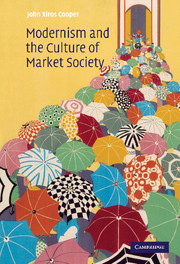Book contents
- Frontmatter
- Contents
- Acknowledgements
- Introduction The modernist avant-garde and the culture of market society
- PART I THE POSTHUMAN SCENE
- PART II THE REGIME OF UNREST: FOUR PRECURSORS
- 5 Bloody farce
- 6 A variegated daguerreotype
- 7 The unnameable
- 8 Childhood as resistance
- PART III THE MARGIN IS THE MAINSTREAM
- Notes
- Bibliography
- Index
7 - The unnameable
Published online by Cambridge University Press: 22 September 2009
- Frontmatter
- Contents
- Acknowledgements
- Introduction The modernist avant-garde and the culture of market society
- PART I THE POSTHUMAN SCENE
- PART II THE REGIME OF UNREST: FOUR PRECURSORS
- 5 Bloody farce
- 6 A variegated daguerreotype
- 7 The unnameable
- 8 Childhood as resistance
- PART III THE MARGIN IS THE MAINSTREAM
- Notes
- Bibliography
- Index
Summary
From the very day of its publication in 1848, Wuthering Heights has provoked perplexity and confusion. In a literary scene acclimatized to realism, and to a moral realism which had as its recent history the ethico-religious traditions of allegory, Wuthering Heights came as something of a shock to contemporary readers. It was acknowledged to display “evidences of considerable power,” but was seen on the whole as “wild, confused, disjointed and improbable” (Examiner, 8 Jan. 1848). On 22 January 1848, the Atlas reviewer found “Wuthering Heights … a strange inartistic story.” Lacking in “unity and concentration,” it “is a sprawling story, carrying us, with no mitigation of anguish, through two generations of sufferers – though one presiding evil genius sheds a grim shadow over the whole, and imparts a singleness of malignity to the somewhat disjointed tale. A more natural unnatural story we do not remember to have read.” In the same month, the New Monthly Magazine reviewer found himself unable to refer to anything that could be compared to Brontë's novel. In the end, he could only refer to the world the novel represented as “a perfect misanthropist's heaven.”
Many of the American reviews in the spring of 1848 are even more uncomprehending. “We rise from the perusal of Wuthering Heights as if we come fresh from a pest-house. Read Jane Eyre is our advice, but burn Wuthering Heights” (Paterson's Magazine, March 1948).
- Type
- Chapter
- Information
- Modernism and the Culture of Market Society , pp. 130 - 147Publisher: Cambridge University PressPrint publication year: 2004



